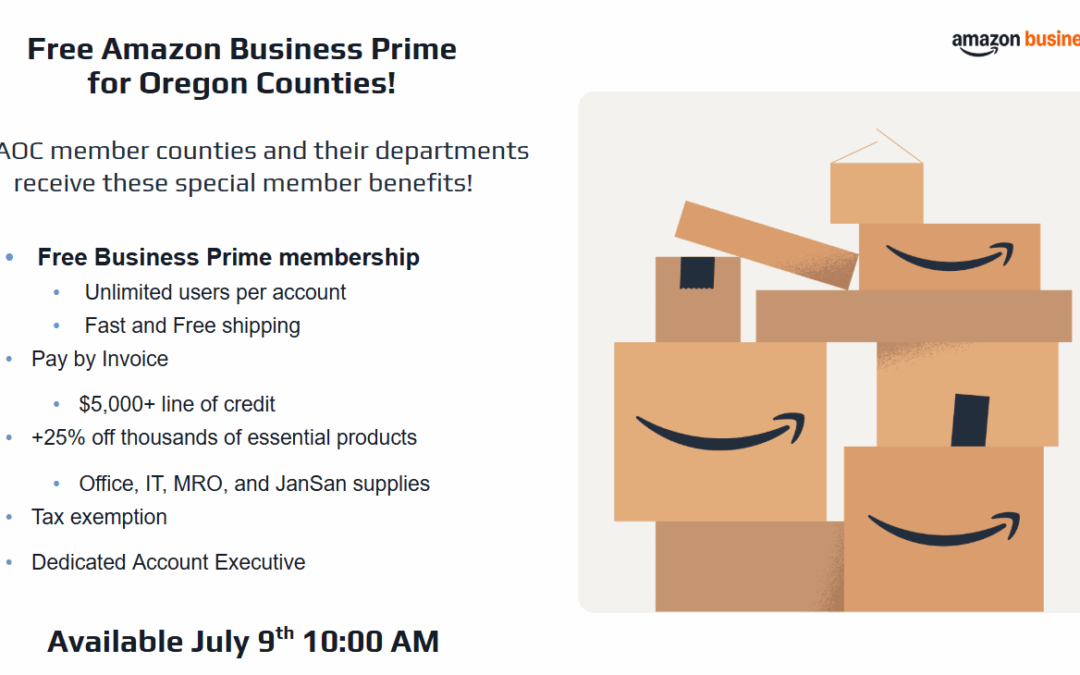
May 30, 2025 | AOC Business Partner
Sponsored content contributed by AOC Business Partner: Transportation and Growth Management Program (TGM)
Oregon is growing—and with that growth comes a powerful opportunity for local governments and communities to shape a more connected, sustainable, and vibrant future. The 2025 Transportation and Growth Management (TGM) Planning Grant application period is officially open, and your community could be one of the next to lead the way in creating thoughtful, inclusive plans for land use and transportation.
Offered through a partnership between the Oregon Department of Transportation (ODOT) and the Department of Land Conservation and Development (DLCD), the TGM program provides funding to help cities, counties, Tribal governments, councils of government, and select special districts plan for livable communities that meet today’s needs while preparing for tomorrow’s challenges.
With approximately $2.5 million available this year, grants typically range between $150,000 and $300,000. Local match contributions are required and may include cash, staff time, direct expenses, or monetized volunteer hours.
Projects must fall under one of two categories:
- Category 1: Transportation System Planning
This includes full or updated Transportation System Plans (TSPs), refinement studies, individual elements such as pedestrian, bicycle, or transit plans, and Safe Routes to School infrastructure plans.
- Category 2: Integrated Land Use and Transportation Planning
Support is available for area plans, downtown plans, and concept plans for areas expanding into urban growth boundaries.
The application deadline is July 31, 2025, and award notifications will be mailed out in September 2025. All application materials, eligibility requirements, and resources can be found on the TGM Planning Grants webpage.
To help applicants navigate the process, the TGM team will host a live informational webinar on June 10, 2025, from 10:30 a.m. to noon via Microsoft Teams. The session will cover updates to the application, how to complete the online form, and common mistakes to avoid. Registration is required to attend.
TGM grants are more than just funding—they’re investments in the vision and values of Oregon communities. Whether you’re aiming to increase mobility, strengthen neighborhood centers, or create safer, more accessible streets, this is your chance to move your plans from concept to action.
For more information or assistance, contact Virginia Elandt at 503-949-1655 or Bill Holmstrom at 971-375-5975.
Oregon’s future is being planned today. Will your community take the lead?
Photo credit: Kathy Kleczek

May 30, 2025 | AOC Business Partner
Sponsored content contributed by AOC Business Partner: Nationwide
Once you have decided how much money to contribute to your Nationwide account each payday, your next decision involves where that money goes.
Retirement plan participants typically decide which asset classes and what percentage of contributions should go into each through a process called asset allocation. There are four major asset classes — stocks, bonds, cash and cash equivalents, and alternatives — each with a different risk and return profile. Generally, the greater the potential risk, the greater the potential return.
Your asset allocation strategy should reflect your financial situation and goals. To create your strategy, you should consider your:
- Financial goals — How well your retirement budget meets your goals may depend on the income you can generate from these investments
- Time horizon — The period between now and when you will begin to convert your investments into income, usually your retirement date
- Risk tolerance — Your comfort level with the possibility of investment loss
Many asset allocation strategies incorporate diversification as a key tactic. Diversification is the process of spreading money across several asset classes and, as your account grows, across several assets in each class. By investing in different asset classes, you reduce the risk of overall investment loss. The theory is, if one asset class underperforms, others may perform better, helping to stabilize returns. Diversification within an asset class helps reduce the risk of loss from a single underperforming fund in that class.
A well-developed asset allocation strategy should adapt as your financial needs and risk tolerance change, helping ensure that your portfolio remains aligned with your goals. You can help accomplish this by committing to regularly reviewing and, when necessary, rebalancing the investments in your Nationwide Supplemental Retirement Plan account.
For assistance in understanding asset allocation and how to use it as an investment strategy, contact your Retirement Specialist. To review or revise your asset allocation, log in to your retirement plan account.

May 30, 2025 | AOC Business Partner
Sponsored content contributed by AOC Business Partner: Covenant Global
Imagine this:
It’s Monday morning. Your county IT staff logs in to find 17 flagged phishing attempts—all blocked automatically. No panicked emails, no scrambling. Just quiet, secure operations. That’s the power of Fortify.
Fortify is a phased cybersecurity hardening program built for counties using Microsoft 365. The first two phases—F1 (Identity & Email Protection) and F2 (Device Security & Visibility)—are often fully funded through Microsoft for qualifying Oregon counties.
Here’s how it works—through real scenarios, inspired by county teams just like yours.
F1: Identity & Email Protection
Imagine this:
Your elections team gets an email from a “state official” asking for voter data. It looks legit. One click could open the door to your network.
But with F1 deployed:
MFA is required for every login. Dangerous emails are filtered by Microsoft Defender. Internal impersonation attempts are shut down before they start.
Outcome: Your inbox becomes a fortress—not a liability.
F2: Device Security & Visibility
Imagine this:
A staff laptop goes missing. You’re not sure if it had sensitive data. It’s a guessing game—and it shouldn’t be.
But with F2 in place:
Every device is tracked through Microsoft Intune. Defender for Endpoint handles security updates and threat detection automatically.
Outcome: No more guessing games—just full control, even in the field.
Why Counties Are Moving Now
When county systems are vulnerable, the impact ripples through entire communities. That’s why Oregon counties are taking advantage of Fortify—without spending additional taxpayer dollars. With Microsoft backing the effort, qualifying counties can get up and running fast—with zero disruption.
Imagine this:
Your IT environment is hardened. Your insurance premiums go down. Your staff feels empowered—not overwhelmed.
Outcome: Security that serves your people, not slows them down
We’re helping Oregon counties access full funding and simple deployment options—before deadlines close. Want to find out if your county qualifies?
📩 Email us at: Sales@covenant.global
🔎 Or schedule a no-cost assessment at: www.covenant.global/contact
Let’s make Oregon more secure—one county at a time.

May 29, 2025 | AOC Business Partner
Purchasing can be challenging and a strain on county budgets. Thanks to a new partner opportunity, Association of Oregon Counties (AOC) members and their county departments can take advantage of free Amazon Business Prime for the entire county which is approximately a $3,499 value.
In addition to receiving free Business Prime, members can access exclusive benefits including a pre-approved $5,000+ line of credit with a pay-by-invoice option. Other benefits include discounts on thousands of products across various counties. By signing up, member counties and their departments can maximize savings in their procurement process.
Member counties who are already paying for Business Prime can receive a prorated refund after signing up. These benefits can be activated on current accounts with no need to create new accounts.
AOC and Amazon Business are offering a webinar on July 9, at 10 a.m., to explain the opportunity and to activate the benefits for participants. Staff responsible for making purchases on behalf of the county are encouraged to register and attend the webinar. Amazon Business account executives will be available during the webinar and afterwards to answer questions and help participants get signed up and activated.
By attending the webinar, members will receive the exclusive AOC Benefit Link and code needed to activate their free Business Prime. The webinar will be presented by Lizette Flore, Amazon Business Senior Account Executive and Tessa Sullivan, Amazon Business Program Manager.
Questions about the webinar or about the business partnership program can be directed to partnerprogram@oregoncounties.org.

May 23, 2025 | AOC News
The Association of Oregon Counties (AOC) is pleased to announce the hiring of Julie Oke as its new office administrator.
Julie brings extensive experience in local government and association support. Her background includes a broad range of expertise in office operations, event coordination, digital communications, and member services. Julie’s deep understanding of the needs of local governments and commitment to public service will be a valuable asset to AOC and its members.
“We are thrilled to welcome Julie to the AOC team,” said Executive Director Gina Nikkel. “Her proven experience and dedication to supporting Oregon’s communities make her an excellent fit for this role.”
Julie’s first day was Monday, May 19.
Contributed by: Erin Good | Communications Coordinator





